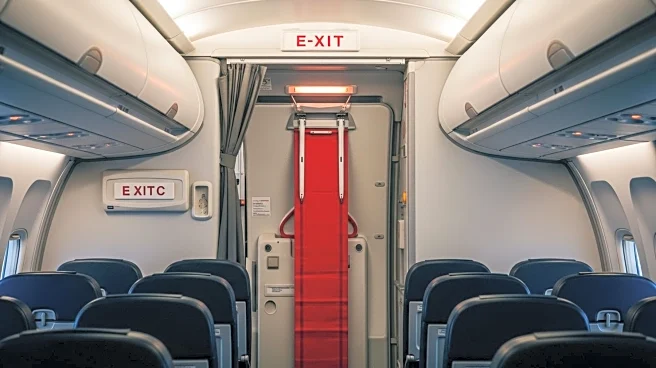What is the story about?
What's Happening?
A United Airlines Boeing 737-800, operating Flight 32 from Tokyo to Cebu, Philippines, made an emergency landing at Kansai International Airport in Osaka, Japan, following a report of a potential fire in the cargo hold. The incident occurred approximately an hour into the flight, which was cruising at 34,000 feet over the Pacific Ocean. Upon landing, the 135 passengers were evacuated using emergency slides, and two individuals sustained minor injuries during the evacuation process. Initial inspections by maintenance personnel revealed no evidence of an actual fire. United Airlines maintains a hub in Tokyo, facilitating connections to various Asian destinations.
Why It's Important?
The emergency landing underscores the critical importance of safety protocols in aviation, particularly concerning potential fire hazards. Fires aboard aircraft, though rare, pose significant risks, as evidenced by historical data from the Federal Aviation Administration indicating that 20% of onboard fatalities between 1891 and 1990 were fire-related. The swift response by United Airlines and adherence to Boeing's guidelines for immediate diversion in case of smoke or fire highlights the industry's commitment to passenger safety. This incident may prompt airlines to review and reinforce their emergency procedures, ensuring preparedness for similar situations.
What's Next?
Following the incident, United Airlines is likely to conduct a thorough investigation to determine the cause of the fire indication and assess the effectiveness of their emergency response protocols. The airline may also collaborate with aviation authorities to enhance safety measures and prevent future occurrences. Passengers affected by the evacuation may receive support and compensation from the airline. Additionally, the aviation industry might see increased scrutiny on fire safety standards, potentially leading to updated regulations and training for flight crews.
Beyond the Headlines
The incident raises broader questions about the reliability of fire detection systems in aircraft and the potential need for technological advancements in this area. It also highlights the psychological impact on passengers who experience emergency evacuations, emphasizing the importance of effective communication and support during such events. The aviation industry may explore innovations in fire prevention and detection technologies to enhance onboard safety.

















